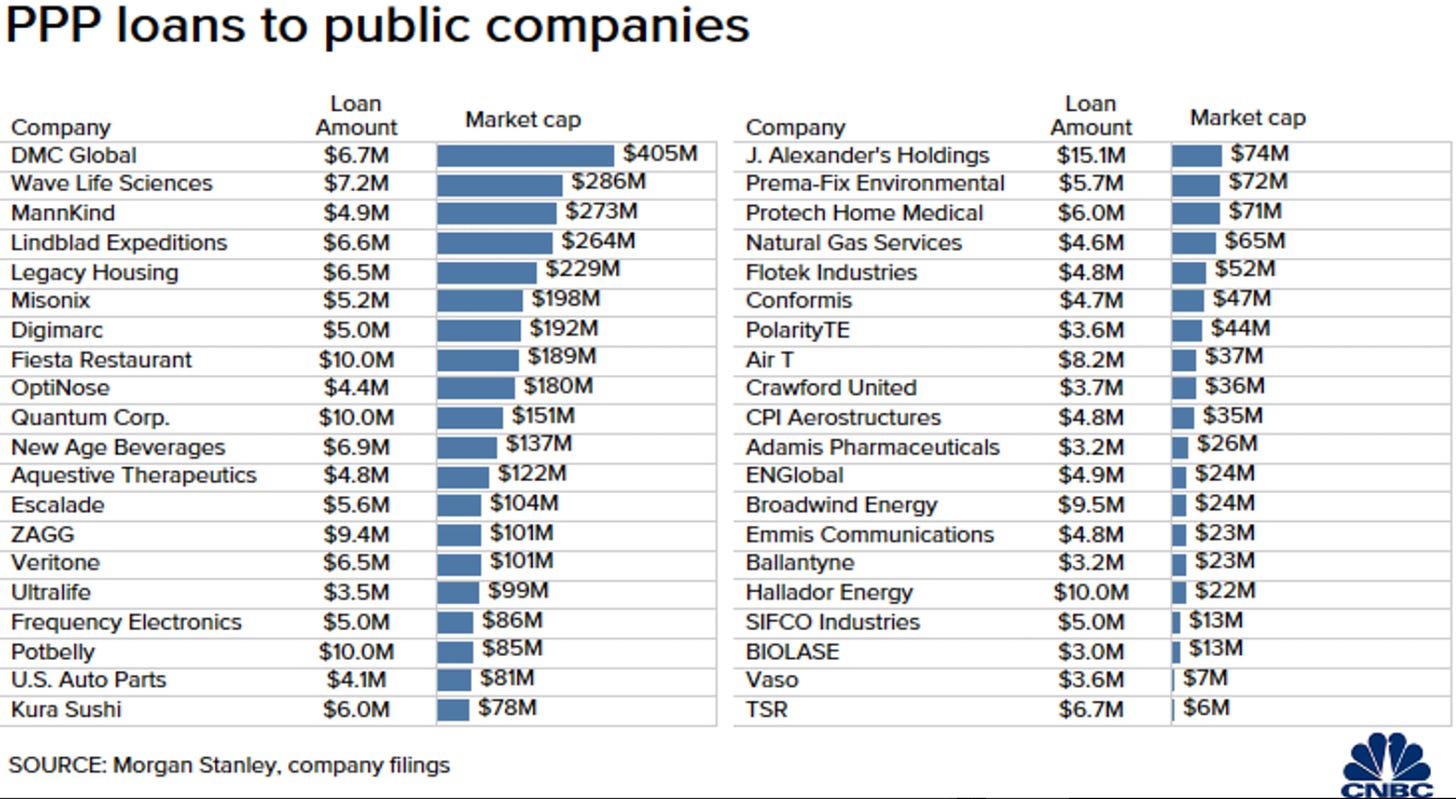Like the newsletter? During this trial period, you get the Founding Member Rate — 50% off the regular cost. Continued thanks to everyone who already has done so!
The World
White House economic adviser Kevin Hassett expects a national unemployment rate of 16% or higher this month and says more stimulus is needed to ensure a strong rebound. “This is the biggest negative shock that our economy, I think, has ever seen,” he said. (Reuters)
U.S. oil prices plunged more than 25% on Monday. In the next chapter of the oil crisis, the industry shuts down. Negative oil prices, ships dawdling at sea with unwanted cargoes, and traders getting creative about where to stash oil. (CNBC, Bloomberg)
Hundreds of millions of dollars of Paycheck Protection Program emergency funding have been claimed by large, publicly traded companies, new research published by Morgan Stanley shows. In fact, the U.S. government has allocated at least $243.4 million of the total $349 billion to publicly traded companies, the firm said. (CNBC)

Tens of millions of pounds of American-grown produce is rotting in fields as food banks across the country scramble to meet a massive surge in demand, a two-pronged disaster that has deprived farmers of billions of dollars in revenue while millions of newly jobless Americans struggle to feed their families. (Politico)
US and Australian warships sail in disputed waters after China bolsters claim, while a China-Russia alliance sits on horizon as nuclear arms treaties crumble. (Nikkei Asian Review)
Why does China invest in the Belt and Road Initiative? This poll: Nigerians living near a major Belt and Road project grew more positive toward China after it was completed. (Pew Research Center)
The Supreme Court on Monday dismissed a major gun rights case from New York because the law in question has been rescinded, disappointing Second Amendment activists and several conservative justices, who said the court had been manipulated. (Washington Post)
Ohio will hold its primary election on Tuesday, a virtually all-mail contest that could serve as a test case for voting in the coronavirus era. However, Ohio’s system has been overwhelmed by the crush of requests for absentee ballots, a situation that could disenfranchise potentially tens of thousands of voters. (Reuters)
New York’s State Board of Elections scrapped the state’s June 23 Democratic nominating contest, citing the risk of spreading coronavirus, in a move opposed by supporters of Bernie Sanders. (New York Times)
Finance
Scott Minerd, Guggenheim Investments Global CIO: “To think that the economy is going to reaccelerate in the third quarter in a V-shaped recovery to the level where gross domestic product (GDP) was prior to the pandemic is unrealistic. Four years from now the economy will most likely recover to the same level of activity that it was in January.” (Guggenheim Investments)

General Motors suspends dividend, stock buybacks to preserve cash. (CNBC)
Investors are snapping up complex securities linked to some of the markets deemed most vulnerable to the coronavirus-driven economic slump, a sign that the yearslong reach for yield has survived the market shock. (Wall Street Journal)
American hedge fund giant Citadel has placed bets worth £275 million against UK supermarket shares. (The Financial Mail)
Is BlackRock the new Goldman Sachs? Its sway extends far beyond its function as a vast asset manager. (Financial Times)
Biden hammers banks, demands new stimulus 'a hell of a lot bigger' than $2 trillion, and calls for new green infrastructure bill. (Politico)
Technology
Apple is pushing back the production ramp-up of its flagship iPhones coming later this year by about a month, as the coronavirus pandemic weakens global consumer demand and disrupts manufacturing and supply chains across Asia. (Wall Street Journal)
Facebook is challenging Zoom for video chat dominance by introducing Messenger Rooms. (Engadget)
Mark Zuckerberg discusses Messenger Rooms and says he’s focused on three areas: Remote presence (feeling like you’re with a person even when you can’t physically be there), small business work, and acute health response. (The Verge)
Israeli firm raises $5 million for tech to recognize mask-covered faces. (Reuters)
Instacart is hiring another 250,000 “shoppers,” people who pluck items off shelves and deliver them to Instacart customers. That follows the hiring of 300,000 shoppers in the past month. (Medium)
More than 1 million Australians downloaded a coronavirus contact tracing app within hours of it being released by the government, while in a U-turn, Germany backs Google and Apple on smartphone contact tracing. (BBC, Deutsche Welle)
Smart Links
College enrollment likely to drop as schools consider staying closed until 2021. (CNBC)
Grocery upstarts race to exploit food delivery overload. (Bloomberg)
Growing meat shortage threat helps lift shares of plant-based protein manufacturer Beyond Meat. (Los Angeles Times)
Eye contact activates the autonomic nervous system even during video calls. (Science Daily)
Zoom video calls wear on the psyche in complicated ways. (National Geographic)
Hubble celebrates its 30th anniversary with a tapestry of blazing starbirth. (Science Daily)

Good News
This Florida student was accepted at all 8 Ivy League schools. (New York Times)
Did you see this? Here’s the backstory. (New York Times)
Thanks for reading. Did you like the newsletter? Why not subscribe now?


